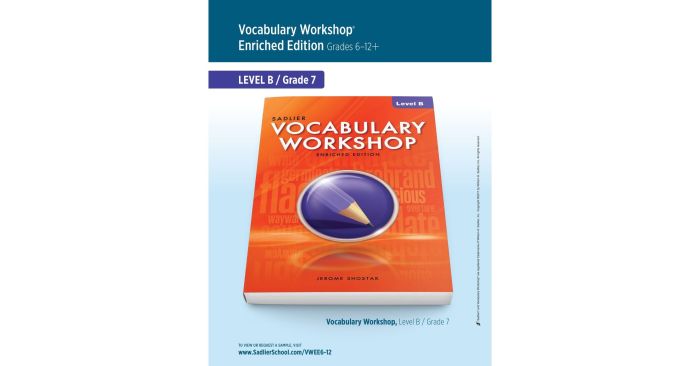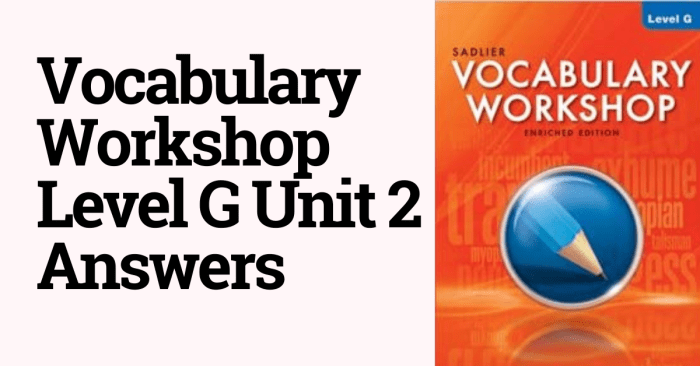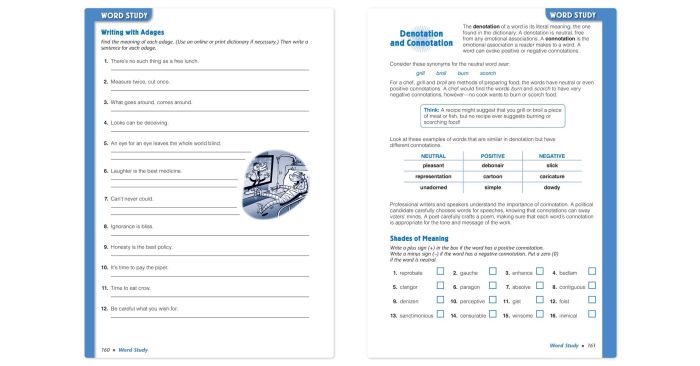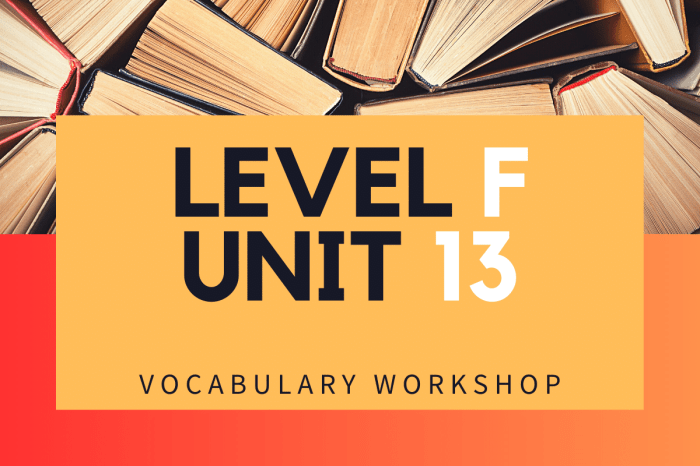Embark on a linguistic journey with Vocabulary Workshop Level F Unit 13, where we delve into the intricacies of language and expand our vocabulary. This unit promises an immersive experience, equipping you with the tools to master new words, comprehend their nuances, and wield them effectively in communication.
Through a comprehensive exploration of word origins, contextual usage, synonyms, antonyms, and figurative language, we will unravel the tapestry of language and empower you to express yourself with precision and eloquence.
Vocabulary Breakdown
Unit 13 of the Vocabulary Workshop Level F introduces a diverse range of words that expand students’ vocabulary and enhance their understanding of complex concepts.
The vocabulary words in this unit cover various parts of speech, including nouns, verbs, adjectives, and adverbs. Each word is meticulously selected to enrich students’ vocabulary and improve their ability to express themselves effectively.
Etymology
Etymology, the study of word origins, provides valuable insights into the evolution and meaning of words. By understanding the etymological roots of select words in this unit, students can deepen their comprehension and develop a more nuanced appreciation for the language.
- Enigmatic: Derived from the Greek word “ainigma,” meaning “riddle,” this adjective describes something mysterious or puzzling.
- Ephemeral: Originating from the Greek “ephemeros,” meaning “lasting for a day,” this adjective refers to something that is short-lived or fleeting.
- Indolent: From the Latin “indolens,” meaning “without pain,” this adjective denotes a state of laziness or inactivity.
Contextual Usage

Contextual usage involves using vocabulary words in meaningful and appropriate contexts to enhance comprehension and retention. By incorporating the words into various scenarios and sentence structures, learners can develop a deeper understanding of their nuances and applications.
Example Sentences
Here are some examples of sentences that demonstrate the correct usage of the vocabulary words:
- The prodigiouschild displayed an exceptional talent for mathematics.
- The ephemeralbeauty of the cherry blossoms was a fleeting reminder of life’s impermanence.
- The austeremonastery provided a sanctuary for those seeking spiritual enlightenment.
- The enigmaticstranger left behind a trail of unanswered questions.
- The exquisitecraftsmanship of the jewelry was evident in its intricate details.
Versatile Usage
Vocabulary words can be used in a variety of contexts to show their versatility. For instance, the word ” prodigious” can be used to describe not only intellectual abilities but also physical feats or creative achievements. The word ” ephemeral” can be used to refer to anything that is transient or short-lived, from human emotions to natural phenomena.
Vocabulary Table
The following table provides a summary of the vocabulary words, their definitions, and example sentences:
| Vocabulary Word | Definition | Example Sentence |
|---|---|---|
| Prodigious | Remarkably great in size, quantity, or degree | The prodigious child displayed an exceptional talent for mathematics. |
| Ephemeral | Lasting for a very short time | The ephemeral beauty of the cherry blossoms was a fleeting reminder of life’s impermanence. |
| Austere | Severely simple or plain | The austere monastery provided a sanctuary for those seeking spiritual enlightenment. |
| Enigmatic | Puzzling or mysterious | The enigmatic stranger left behind a trail of unanswered questions. |
| Exquisite | Extremely beautiful or delicate | The exquisite craftsmanship of the jewelry was evident in its intricate details. |
Synonyms and Antonyms: Vocabulary Workshop Level F Unit 13

Synonyms are words with similar meanings, while antonyms are words with opposite meanings. Identifying synonyms and antonyms is essential for expanding vocabulary and understanding the nuances of language.
When encountering unfamiliar words, it is helpful to look for synonyms that provide a more familiar or understandable meaning. Antonyms, on the other hand, can help clarify the meaning of a word by providing a contrasting perspective.
Synonyms
Here are some examples of synonyms for the vocabulary words from Unit 13:
- Accommodate: house, lodge, shelter
- Apprehend: arrest, seize, capture
- Contemplate: consider, ponder, reflect
Antonyms
Here are some examples of antonyms for the vocabulary words from Unit 13:
- Accommodate: reject, refuse, deny
- Apprehend: release, liberate, free
- Contemplate: ignore, dismiss, disregard
Understanding the nuances between similar words allows for precise and effective communication. By expanding vocabulary and recognizing the relationships between words, individuals can enhance their language skills and convey their thoughts and ideas with greater clarity.
Word Relationships
The vocabulary words in Unit 13 are all related to the theme of “power and influence.” They can be grouped into several categories based on their meaning and usage:
Authority and Legitimacy: This category includes words that describe the formal or informal power that someone has over others. Examples include authority, legitimacy, sovereignty, mandate,and jurisdiction.
Influence and Persuasion: This category includes words that describe the ability to shape the opinions or behavior of others. Examples include influence, persuasion, charisma, manipulation,and propaganda.
Resistance and Opposition: This category includes words that describe the actions taken by those who resist or oppose authority or influence. Examples include resistance, opposition, dissent, rebellion,and civil disobedience.
The following mind map illustrates the connections between these categories:
Mind Map:
Power and Influence
|
|
Authority and Legitimacy Influence and Persuasion
| |
Authority Legitimacy Sovereignty Mandate Jurisdiction
| |
Influence Persuasion Charisma Manipulation Propaganda
| |
Resistance Opposition Dissent Rebellion Civil Disobedience
Figurative Language

Figurative language is a powerful tool that writers use to create vivid images, evoke emotions, and convey complex ideas in a memorable and engaging way.
It enhances the meaning and impact of the text by allowing the writer to express themselves in a creative and imaginative manner.
Similes
Similes are comparisons between two things using the words “like” or “as.” They help create vivid images and make the text more relatable and understandable. For example, in the unit’s text, the author describes the sun as “like a golden coin” to emphasize its brightness and warmth.
Metaphors
Metaphors are comparisons that equate two things without using the words “like” or “as.” They create a more profound connection between the two things being compared. In the unit’s text, the author refers to the moon as “a silver sickle” to suggest its shape and ethereal beauty.
Personification
Personification is a figure of speech that gives human qualities to nonhuman things. It helps make the text more engaging and relatable by allowing the reader to connect with the nonhuman object on a personal level. In the unit’s text, the author describes the wind as “whispering secrets” to create a sense of mystery and intrigue.
Other Literary Devices
In addition to similes, metaphors, and personification, the unit’s text also employs other literary devices such as hyperbole, understatement, and irony. These devices contribute to the overall tone and atmosphere of the text, making it more expressive and engaging for the reader.
Vocabulary Building Activities

Engaging activities are essential for effective vocabulary building, fostering student interest and comprehension. These activities should be designed to challenge students while providing opportunities for repetition and practice.
Incorporating games, puzzles, and creative writing exercises into the curriculum can transform vocabulary learning into an enjoyable and interactive experience.
Games, Vocabulary workshop level f unit 13
Games provide a playful and competitive environment for students to test their vocabulary skills. Consider games like:
- Charades:Students act out words or phrases for their team to guess.
- Pictionary:Students draw words or phrases on a whiteboard for their team to guess.
- Word Bingo:Students create bingo cards with vocabulary words and listen for the words to be called out.
Puzzles
Puzzles challenge students to think critically and apply their vocabulary knowledge. Consider puzzles like:
- Crosswords:Students complete crossword puzzles with clues that require them to use specific vocabulary words.
- Word Searches:Students search for vocabulary words hidden within a grid of letters.
- Anagrams:Students rearrange letters to form vocabulary words.
Creative Writing Exercises
Creative writing exercises encourage students to use vocabulary words in context and express their understanding. Consider exercises like:
- Storytelling:Students create stories using a predetermined list of vocabulary words.
- Poetry:Students write poems that incorporate vocabulary words.
- Descriptive Writing:Students describe scenes or events using rich vocabulary.
Assessment Strategies
To assess students’ vocabulary comprehension effectively, educators can employ various assessment strategies. These strategies aim to evaluate students’ understanding of vocabulary words’ meanings, usage, and relationships within context.
Types of Assessments
Different types of assessments can be used to evaluate vocabulary comprehension. These include:
- Quizzes:Short, timed assessments that test students’ recall of vocabulary words and their meanings.
- Essays:Extended writing assignments that require students to demonstrate their understanding of vocabulary words in a written context.
- Projects:Creative or research-based assignments that allow students to explore vocabulary words in depth and apply them in meaningful ways.
Rubrics and Grading Criteria
To ensure consistent and objective assessment, rubrics or grading criteria should be developed for each type of assessment. These rubrics should Artikel the specific criteria used to evaluate students’ work, such as:
- Accuracy of vocabulary definitions
- Correct usage of vocabulary words in context
- Depth of vocabulary knowledge
- Creativity and originality in using vocabulary words
FAQ Compilation
What is the purpose of Vocabulary Workshop Level F Unit 13?
Vocabulary Workshop Level F Unit 13 aims to enhance your vocabulary and comprehension skills, providing you with the tools to master new words and use them effectively in communication.
What topics are covered in this unit?
The unit covers a wide range of topics, including word origins, contextual usage, synonyms, antonyms, figurative language, and vocabulary building activities.
How can I benefit from completing this unit?
Completing this unit will expand your vocabulary, deepen your understanding of language, and improve your ability to express yourself clearly and effectively.